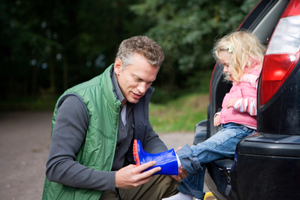Divorce is never easy. The process brings about a lot of inner turmoil. You may have had high expectations for your marriage, only to see things go sour.
Divorce does allow you to move on, though, so you can find a better relationship. However, if you have children involved, you will always be linked to your ex-spouse. This may not be a good thing, especially if you two had a tumultuous relationship. If you never got along well while you were married, then co-parenting after divorce will not be easy.
While you may be hurt or upset at your partner over the divorce, you need to be mature about the situation. Children thrive when they have both parents actively involved in their lives. While you may want to seek revenge and ask for sole custody, this does nothing to benefit your children, unless serious issues such as abuse or substance use are involved.
Having a cooperative relationship is highly beneficial for children. They reap benefits such as more security, a consistent routine and better emotional and mental health. They also learn problem solving skills along the way and have a good example to guide them as they get older and experience their own relationships.
Successful Co-Parenting
So how can you set up your family for successful co-parenting? Here are some tips to follow:
- Set aside anger. Your children’s needs come first, so stop thinking about seeking revenge and focus on healing and moving on. This will be hard, but it is necessary so you do not engage in behaviors that could make the process more complicated. Take steps now to move on from the bitterness you may feel.
- Improve communication with the other parent. This may seem impossible, especially if you had problems talking to your spouse when you were married, but you need to make this work. Establish conflict-free communication, whether it is in person, on the phone, or via email or text. Make requests and listen. Make the kids your focus and stay calm.
- Be a team. While teamwork did not make your marriage work, you need to be a team player when it comes to co-parenting. This means cooperating without badmouthing and staying consistent when it comes to rules, discipline and other expectations. You and the other parent should also be able to agree on major decisions, such as education, medical care, and finances.
- Be flexible. Co-parenting should be about what the children want, not the parents. Even if there is a parenting plan in place, you do not always have to keep to such a rigid schedule. Let your child decide whether or not he or she wants to spend time with the other parent. However, this does not mean that you should not let the other parent have custody at all if the child does not want to go to the other parent’s house.
Fixing Co-Parenting Mistakes
Let’s face it: Co-parenting is not easy. It is not going to go as planned. You will both make mistakes along the way and that is to be expected. Maybe you got upset and said mean things about the other parent in front of your kid. Or maybe you backed out on a promise and made your child angry at you.
These things happen, but the main thing is that you need to learn from these mistakes. If you allow them to continue to happen, you send mixed messages to your children and cause them a lot of hurt and anger toward one or both parents. Here are some ways to fix co-parenting mistakes.
- Apologize. Do not just ignore the situation and hope your kids will forget about it. You need to take action and apologize for your mistakes. Swallow your pride and take responsibility for your mistakes. It is a good way to teach your children that people make mistakes but they need to own up to them.
- Do not place your children in the middle. If you need to communicate with the other parent, that is your responsibility. Do not give your children messages to tell Mom or Dad. They need to be treated as children, not mediators. Learn to communicate better with the other parent.
- Do not make children feel split in two. It is bad enough that they have to be shuttled between two different homes. This can already make them feel confused. When you buy them clothes or toys, allow them to feel ownership of them. Do not enforce rules such as making the belongings stay at your home only. Their possession should not be dictated by one parent or the other. Make your children feel whole.
- Do not assume everything is OK. Children have feelings about the divorce, too, just like you do. While they may seem fine, children express feelings in different ways. Some withdraw and isolate themselves, while others act out and throw tantrums. Neither of these ways are ideal for expressing emotions, so allow your children to express what is wrong and find ways to remedy the situation.
Seek Legal Help
Parenting is hard enough when you are married. After a divorce, things can get complicated. Rules may become inconsistent. One parent may want more control over the other. As a result, children get confused and may even act out.
We all make mistakes, but with effective co-parenting, you can help your kids move on from divorce. Broward County divorce attorney Scott J. Stadler has experience helping Florida families navigate the challenges of life after a divorce. Get help with your parenting situation today. Fill out the online form or call (954) 346-6464.

